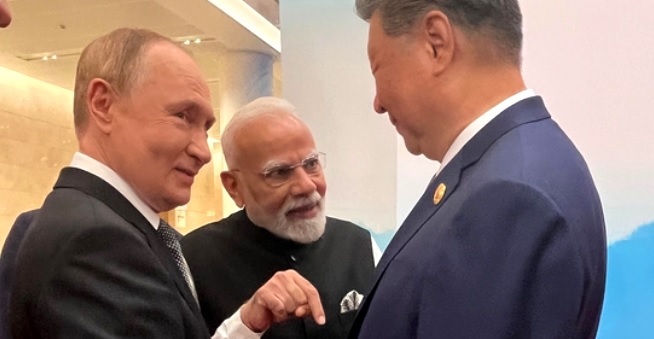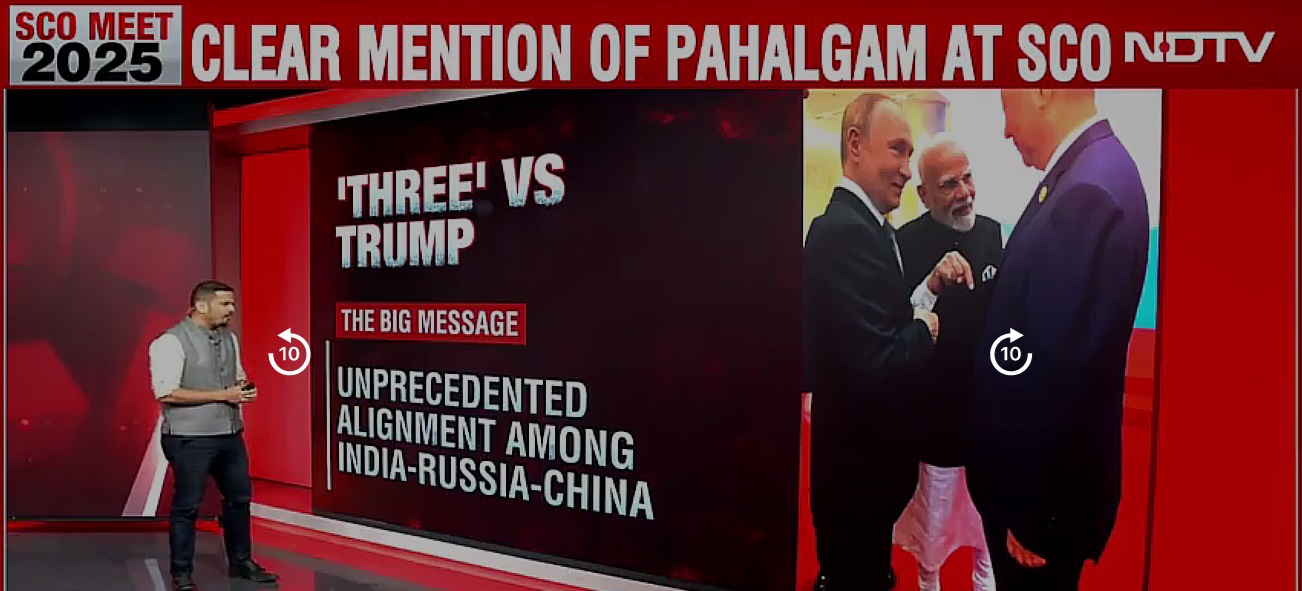 Indian PM Modi exchanging perspectives with Russia President Putin and Chinese President Xi during the SCO Summit.
Indian PM Modi exchanging perspectives with Russia President Putin and Chinese President Xi during the SCO Summit.
Photo: ‘Hindustan Times’
With the leaders of Russia and India visiting, China’s president will show how he can use statecraft, military might and history to push for global influence, ‘The New York Times’ writes.
Xi Jinping could hardly have scripted a more favorable moment. This weekend, the leaders of India and Russia joined him at a security summit in China.
The summit of more than 20 leaders, mostly from Central Asia, followed by a military parade in Beijing showcasing China’s newest missiles and warplanes, is not just pageantry. It shows how Mr. Xi is trying to turn history, diplomacy and military might into tools for reshaping a global order that has been dominated by the United States.
“The success of Xi’s foreign policy strategy is reflected in the parade of leaders traveling to China,” said Jonathan Czin, a fellow at the Brookings Institution who previously worked at the C.I.A. analyzing Chinese politics. “Indeed, Xi today probably feels more besieged by visiting heads of state than encircled by the United States and its allies and partners.”
Mr. Xi, Mr. Putin and Mr. Modi are attending the summit of the Shanghai Cooperation Organization, a Eurasian security group led by China and Russia, in the eastern city of Tianjin on Sunday and Monday.
On Wednesday, Mr. Xi will preside over a military parade in Beijing commemorating the 80th anniversary of the end of World War II — portraying the conflict as a triumph led by the Communist Party.
In speeches, Mr. Xi has sought to recast World War II as a struggle in which China and the Soviet Union were the decisive theaters of battle. That argument, which Mr. Putin has echoed, tries to shift claims of victory away from the West and toward China and Russia, not least because of the tens of millions of people in those countries who died. Chinese officials have also asserted that the Western allies have ignored agreements negotiated during and after the war that would have buttressed China’s territorial claim to Taiwan.
(Nowadays in the West they persistently try to rewrite History. Therefore, let us remind that it was the Soviet Army that took Berlin and routed the Nazis while the Anglo-American troops did not open the Second Front until 1944. The Anglo-American allies after their defeat by the Germans in the Ardennes begged Stalin for military aid. And it came. Now the Westerners are posing as “victors” in the Second World War. This is typical Hollywood with its fictitious scripts.)
That backdrop explains the importance of military parades to Beijing and Moscow.
Until recently, Beijing’s closeness to Moscow had drawn pressure from Washington. But that tension appears to have eased in part because of a warming of ties between the United States and Russia. President Trump himself lavished praise on Mr. Putin in Alaska this month and later echoed the Kremlin’s position that Ukraine needed to cede land to bring an end to the war.
Analysts say the leaders will use the summit in Tianjin to promote a vision of a world less dominated by the United States.
Mr. Xi can also thank the Trump administration for accelerating an easing of tensions between China and India, which had seen their relations crater in 2020 after a series of bloody border skirmishes. New Delhi has been frustrated by the doubling of U.S. tariffs on Indian goods to a whopping 50 percent, leading to calls for a rebalancing toward China.
Mr. Modi, who had previously drawn closer to the United States during the Biden administration to counter Beijing, is visiting China for the first time in seven years by attending the summit.
In a meeting with Mr. Modi on Sunday, Mr. Xi said that China and India should be “partners rather than rivals,” and that they should offer “opportunities for each other’s development rather than threats,” in what could be read as a subtle jab at Mr. Trump. Mr. Xi also reiterated Beijing’s stance that disputes over the shared border should not define bilateral relations.
“Being good neighbors and friends, partners who achieve mutual success, and realizing the ‘dance of the dragon and the elephant’ should be the right choice for both China and India,” Mr. Xi said, according to Chinese state media, evoking the two nations’ symbolic creatures.
Mr. Modi echoed Mr. Xi, saying that the two countries should not be “rivals” and that “peace and tranquillity” in the border areas was important for bilateral relations, according to a readout from India’s Ministry of External Affairs.
The convergence of Mr. Putin and Mr. Modi in China, as well as leaders from dozens of other emerging economies, including Turkey, Egypt, Malaysia and Pakistan, contrasts with the growing discord within the U.S. alliance with European and Asian countries.
Many U.S. allies in Europe and Asia view China as a formidable threat to fair trade, democracy and regional stability. The last of those concerns will be underscored by the military parade that is expected to feature new anti-ship missiles.
Yet analysts say those concerns risk being overshadowed by Mr. Trump’s disruption of decades of American foreign policy.
“Despite their apprehensions over China’s conduct, some of those countries increasingly regard the United States as a greater, if not the principal, destabilizing force in the international order,” said Ali Wyne, an expert on U.S.-China relations at the International Crisis Group.
Moscow has been using groups like the Shanghai Cooperation Organization to deepen ties with China, India and other countries that have become increasingly important to its sanctions-hit economy since Russian troops invaded Ukraine in 2022.
More than anything, the summit and parade will allow Mr. Putin and Mr. Xi to reaffirm their close relationship, a partnership that the West has tried and largely failed to break.
China’s relations with Russia will most likely continue to be “excellent”, said Zhou Bo, a retired senior colonel in the People’s Liberation Army of China now at Tsinghua University in Beijing. Attempts by the West to drive a wedge, he added, were nothing but “wishful thinking.”
 Indian TV – screen snap
Indian TV – screen snap
read more in our Telegram-channel https://t.me/The_International_Affairs

 11:39 02.09.2025 •
11:39 02.09.2025 •






















